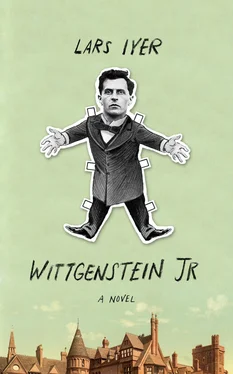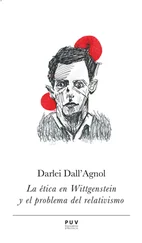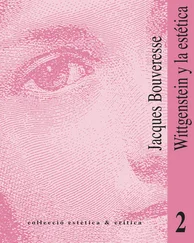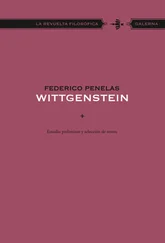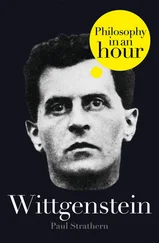He’s the clown brought in to amuse us. To keep us entertained. To keep us occupied before we begin the real business of life .
We smile — just like the dons. We indulge him, we enjoy him — just like the dons. But we tire of him, too — just like the dons. We are impatient with him, too — just like the dons. Perhaps laughing at him (a little). Perhaps with scorn (a little scorn). Smiling at him, but tiring of him, too. Smiling, smiling, but with a certain impatience .
Next! , we want to say— we’re tired of this one! Next! , we demand— bring us a fresh one!
There’s a fire backstage, he says. The clown comes out to warn the audience. Laughter and applause. They think it’s a joke! The clown repeats his warning. The fire grows hotter; the applause grows louder. That’s how the world will end, Wittgenstein says: to general applause, from halfwits who think it’s a joke.
We should hate him, he says. We should hate thought, and the labour of thought. Because thought is opposed to everything we are. Logic is opposed to our very existence.
But we do not hate him, he says. We do not hate thought. Because there is a whole system to do the hating for us. A whole university— Cambridge University — that hates him and hates thought on our behalf.
We’ve outsourced our hatred, he says. We’ve sold it on, like a debt. We’ve subcontracted it, so that we can forget about it. The university hates him in our place, he says. The dons hate thought, especially his thought, in our place.
WITTGENSTEIN: Cambridge hates me. Cambridge wants to destroy me. Well, Cambridge might have succeeded. You might have succeeded.
He slumps into a chair.
Silence.
Wie traurig! , he cries. What unhappiness!
Silence.
Mulberry in his FUCK THE FUCK T-shirt. Doyle, hand on Mulberry’s arm. Titmuss, looking out of the window. The Kirwins, looking down at their trainers. Chakrabarti, looking up at the ceiling …
The glass-fronted bookshelves, with their bound journals. A fly circling. The parquet floor. The humming computer. The cream-coloured radiators.
Silence.
Wittgenstein rises and leaves the room.
We wait, not knowing what to do.
Didn’t he understand that our laughter didn’t mean anything? That it was nothing personal? That it was least of all a judgement on him …
Guilt. Should someone go after him?
Doyle walks out into the corridor, and back again.
No sign of him.
We file out, leaving the room empty behind us.
A walk on the Backs, without Wittgenstein.
Doyle, head sunk in guilt. Chakrabarti, shoulders hunched in shame. Mulberry, jacket pulled tight round his T-shirt, eyes lowered in repentance …
With Wittgenstein we see ourselves as learners, as students, as eternal ephebes. We see ourselves as apprentices, as prodigies — as youths, eternal youths, on the brink of everything …
We must admit it: we like the romance of learning . We like the romance of having our very own thinker . And who else but us will heed what he says?
The thinker is alone but for his pupils. The thinker rides the clouds in thought, stands on Atlas’s shoulders, belongs to the starry heights — but only his pupils know it. The thinker is the open Delphi, looking upon visions beyond mortal sight — but only we, his students, can see it.
We have a duty to Wittgenstein. To witness. To record. To relay the Message. To watch over the gift of the Master …
The next day. Ede and I at the porters’ lodge. The usual bustle. We’re Wittgenstein’s students. We want to ask him something .
The porter makes a call.
Wittgenstein doesn’t want to see anyone.
Ede and I tailgate two students past the porters’ lodge, and climb the staircase to Wittgenstein’s rooms.
We knock at his door. Silence. We bang at his door. Still silence.
We sit on the cold steps, waiting.
ME: You don’t suppose anything’s happened to him, do you? You don’t think we’ve driven him to something? Remember what happened to his brother …!
An hour passes. We salve our conscience by applying ourselves to the real Wittgenstein. Ede brings out the Tractatus Logico-Philosophicus . Tries to read it. Puts it away again. I pull out the Philosophical Investigations . Try to read it. Put it away again. Ede orders Wittgenstein in 90 Minutes on his phone.
We look up the Wittgenstein entry on Wikipedia. Very long! We search for pictures instead. A glum Wittgenstein, standing by a blackboard. A dour Wittgenstein, walking with a friend. Wittgenstein, gloomy in tartan. Wittgenstein, in profile — clearly suicidal.
We google cheery Wittgenstein . No results.
• • •
We hear movement. From inside his rooms. The lock turns. The door opens. Wittgenstein, dishevelled but alive.
WITTGENSTEIN: What are you doing here?
EDE: We came to see if you were alright.
A pause.
WITTGENSTEIN (as from a great distance): I am not alright.
EDE: Look, we’re very sorry we laughed. We didn’t mean anything by it.
WITTGENSTEIN: You were right to laugh. (A pause.) How dare I teach a class! How dare I harm you by my teaching! (A longer pause.) All this talk of my Logik ! Vainglory! Vanity!
Visible beyond the door: his table, a pile of notebooks, loose sheets, an open ledger — blank. Scraps of paper pinned to his walls, covered in handwritten proofs. In scrawled remarks. Just visible: APERION , in capital letters.
WITTGENSTEIN: There is no Logik ! There’s nothing, nothing. I am nothing. (Another long pause.) I heard laughter outside my room. Your laughter. I came out to hear you. I thought to myself, There’s a clue in their laughter. There’s something I must find .
His stare is very intense. Desperately intense, we agree afterwards.
Town. A concrete piazza, scattered with steel bollards. Surveillance cameras on high masts. New buildings, grotesquely aping the old ones, with decorative brickwork and painted gables. Office complexes with scholarly names (Academy House; Scholars’ Grove, and so on).
WITTGENSTEIN: Cambridge has died, in its heart. It happened quickly. The rest of it will die much more slowly. (A pause.) A kind of rigor mortis has set in. A stiffness of the limbs. (A pause.) Cambridge is becoming brittle . Cracking, like ice in a puddle. Splintering. There are sharp edges in Cambridge. Careful! There are spikes and shards .
Near the station. Luxury apartments (‘price on application’) with stuck-on balconies. Investors’ megaflats, with staring windows and slanted roofs on stilts.
He walks. We walk.
Thought is howling: can we hear it? he says. Logic is howling. The wind is tearing the world to shreds. Now it begins: the great desolation. Now it will come: the storm of the cosmos.
The sky is cracking: can we hear it? The sky is about to shatter. The stars are stigmata drilling into the night. The earth is groaning. It sings, it groans.
• • •
Thought is exploding inside him, he says. Logic is exploding inside him.
Philosophy is loose inside him, he says. Philosophy is devouring him from within.
And when it has finished with him? When it has done devouring? But it will never finish with him, he says. There will always be more of him to destroy.
Belvedere Tower, domineering. The Leisure Park opposite — faceless, looming.
His brain is going out, he says. His brain is exploding.
He is being kept alive, he says. But for what purpose?
Читать дальше
